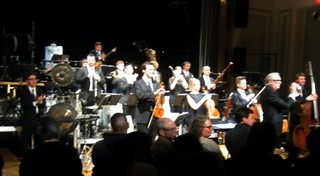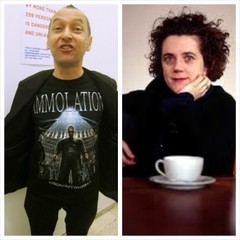|
Back
When Eternity Seems Short New York
Czech Center-Bohemian National Hall
03/07/2014 -
Vienna Reinvented:
Olga Neuwirth: un posto nell’acqua (Melville-Skizze) (American premiere)
Bernhard Gander: Take Nine for Twelve (American premiere)
Pierluigi Billone: Mani.Long (American premiere)
Talea Ensemble: Barry Crawford (Flute), Arthur Sato (Oboe), Rane Moore, Marianne Gythfeldt (Clarinets), Ryan Muncy (Saxophone), Adrian Morejon (Bassoon), Jeff Missal (Trumpet), Mike Lormand (Trombone), John Gattis (Horn), Dan Peck (Tuba), Alex Lipowski, Matthew Gold, Michael Truesdell (Percussion), Stephen Gosling (Piano), Owen Fader (Electric Guitar), Eric Carlson, Yuki Numata Resnick (Violins), Elixzabeth Weisser (Viola), Chris Gross, John Popham (Celli), Greg Chudzik (Bass), David Adamcyk (Electronics/Production), James Baker (Conductor)

The Talea Ensemble (© Coco T. Dog)
The title for this month-long festival of Viennese music is “Vienna: City of Dreams.” That might have been fine for Doctor Freud (“Ach, so this Fräulein vus dreaming she was naked on a streetcar, and that’s why der lady is a tram.”). But composers don’t dream: they have earthly concepts and must work arduously to make their concepts into musical realities.
The three composers last night at the Czech Center must have worked harder than normal, for the three orchestral pieces were dazzlingly difficult. The fact that the Talea Ensemble seemed to play them without a hitch, that they had fun in taking every single mad color, strange tempo and weird ensemble work, says much for this group of technical powerhouses.
It’s one thing to have a string quartet like Arditti, who work together, working over each impossible technical challenge. But Talea last night coordinated not only double-notes on a tubas and bassoons, bassoon, quantum-difficult percussion instruments (which needed a trio of artists for their Augean labors) and a conductor, James Baker, who has spent a lifetime with this music, Apparently, he can read one of these insanely complex scores like the rest of us read Eine kleine Nachtmusik, and get his orchestra to do the same thing.
And what was the music like? The idea of a First and Second Vienna School is long past. Composers today feel about Webern the way Schoenberg felt about Wagner and Mahler. In the words of Oscar Hammerstein, “They’ve gone about as far as they can go.” Which means that composers find their own way, fight through the morass of “schools” through brilliant techniques and 21st Century views of seeing the world. In fact, the three pieces last night could have been classified as “Stasis”, “Kinesis” and “Noise/Silence.”

B. Gander, O. Neuwirth (© Coco T. Dog/Steve Kilpatrick)
The stasis wasn’t quite static at all, Olga Neuwirth, living in New York now and passionate about Herman Melville, created a seascape/soundscape of uttermost beauty. As in all three works, brass was uppermost. Not shining clarion brass but a brass of low, dark, trilling, menacing or–in the case of Ms. Neuwirth–subterranean brass, sub-aquatic brass.
We began with this almost unmoveable sea of different colors, light rhythms. If any color was important it was the Chinese sheng, a wind oboe-like instrument which wasn’t even in the score. The oboe and other instruments did their best to imitate it. That was until Ms. Neuwirth brought forth the endless cascades from the orchestra. Slow orchestral notes tiptoeing down the full orchestra, a vague dynamism, which alternated with this soundscape.
At times, I heard a tune coming from the palette. One simple melody, one melody in jig time, but they soon sank under the tides.
Would Melville–whose writing inspired this–have enjoyed it? Oh, yes. Melville’s mysticism was so deep that he never labeled himself a Transcendentalist, like his Concord friends. He had no label, but his heart ran with this kind of music, Like the White Whale, unknowable, a spirit, sometimes menacing, always, always a figment of something spiritual.
Bernhard Gander’s Take Nine For Twelve was the opposite. The exact same orchestral forces, but with the influence of rock, heavy metal, jazz (notably Dave Brubeck’s Take Five), this measurably complex work (pun intended) varied in rhythms from in a dozen different meters. But always, this was a syncopated music, loud and rhythmic, electrically pulsing forward, with the percussionists galvanizing their beats on metal sheets, drums, tam-tams, and a variety of other paraphernalia on stage.
It was complex, yes. But Mr. Gander’s genius is that it was unlabored complexity, as if the varied meters, sounds, pulsing came in one natural sweep. And it was also (blush) an entertainment.
After the intermission, Pierluigi Billone’s Mani.long was the 50-minute offering. Better to quote the program than listen:
“One makes as if to enter a ritual space, a temple in which human beings are present and act with more or less intensity and to remain inside of it for fifty minutes, even if unnoticed.”
Er...yes...I guess so. His sound paintings with this large orchestra were brilliant, his inventions were abstruse, but Mr. Billone was also interested in silence.
Silence so silent that I thought (and confess, hoped) it was finished. But, as Beethoven did in the 19th Century, he fooled us all with those supposed endings, and kept on going. I varied my time with love for what he was doing, and then thinking about some books I’ve been reading. And didn’t believe I’d missed anything.
Time, indeed is eternal. But 50 minutes can seem far far longer than eternity.
Harry Rolnick
|